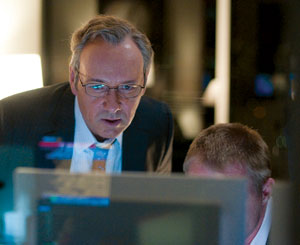

ACTOR Paul Bettany comments in the press notes for Margin Call, “It’s like David Mamet, but in a good way.” No, a better way. The film’s subject is workplace ruthlessness, a topic Mamet branded with Glengarry Glen Ross. Visually, Margin Call is a gathering of besuited men. The one woman (Demi Moore) hardly has a ledge to jump off of.
A 107-year-old Wall Street brokerage firm is clearing the decks with a brutal layoff. Men are all but frog-marched out with their cardboard boxes in their hands. Rent-a-cops in polyester jackets follow them out to make sure they cause no fuss. To calm the remaining traders, middle manager Sam (Kevin Spacey) tells his employees: “You were better. Now they’re gone. Never to be thought of again.”
The dialogue has just that blank-verse quality. The characters ask questions they don’t want answered, and nobody answers anyway. Their talk is like numerical glossolalia: the amount of their salaries, the speculation on the salaries of their bosses and rivals, the money they have spent or squandered.
Stanley Tucci, as Eric, the most human of them—the one who goes to the wall first—has a knack. Even in the dawn after a sleepless night, he can do a mental time-benefit analysis, counting the years he saved commuters, back when he was an engineer, back when he was doing something that helped people.
The film has no proactive hero as such. One bloodless young genius is Peter, who works in the Risks department. He seems good at his job and seems to register some pity about the layoffs. Peter is played by the actor (and producer here) Zachary Quinto; he plays it very neutral and looks poreless and slightly synthetic. Like playing Jesus, once you play Spock, it’s hard to come back.
The just-laid-off Eric gives Peter a thumb-drive as he leaves. Late at night, when Peter analyzes the data, he sees figures that spell the certain doom of the brokerage.
Word gets out. Helicopters arrive at 3am bearing the preternaturally calm (or completely insane) company headman, John Tuld, played by Jeremy Irons. Tuld enjoys talking down to his subordinates—not in a Mamet tirade but in the cordial patronization of a public-school headmaster.
Considering the size of the debacle and the lateness of the hour, Tuld is unruffled by the company’s assets: “The biggest bag of odorous excrement in the history of capitalism.” What’s in the bag? The word “mortgage” is not even being mentioned until a half-hour into the movie.
First-time feature filmmaker J.C. Chandor is the son of a 40-year Merrill Lynch employee. Speculate, if you like, how Chandor knows what we’re all learning piece by piece: the pathological abstraction of the financial industry and its happy willingness to ruin others.
Margin Call was shot in Red camera. This means the post-Soderbergh look: ultraclose profiles; the glowing translucent polka dots of diffused traffic lights through moist car windows; clam-colored Manhattan skies and office bathrooms where characters are cornered.
As for Spacey: He’s played hard-ons. He’s also done penance for meanness by playing saintly sad men, in New Age tripe like Pay It Forward and K-PAX. But he has never had a chance to be this well-rounded (and, yes, I remember American Beauty). He’s brought down to earth, by a commonplace tragedy with his pet dog that’s so simple that it’s a big risk for a writer to use it.
Coming to terms with a life spent making horrendously rich people horrendously richer, Spacey’s Sam delivers a line that’s both too good to spoil and so good it echoes.
For that matter, Irons’ speech about the numbers has its own ringing quality. Tuld talks of how the few booms and the many, many busts never change the invariable percentage of the wealthy to the poor.
Margin Call may seem particularly relevant, then, if the “99 percent” idea catches on as a nickname—used as it is by the protesters keeping their vigils in the financial districts everywhere.
R; 105 min.



